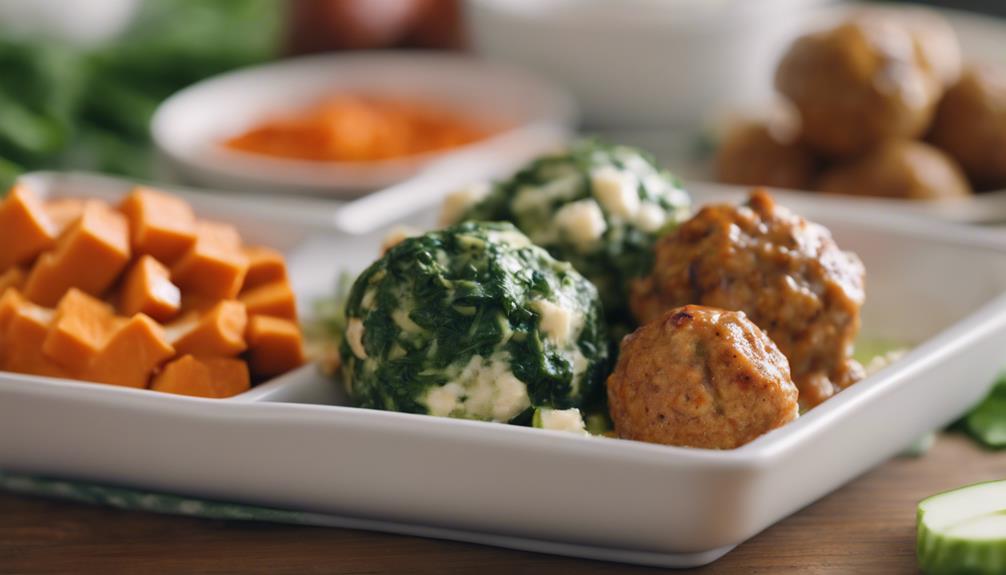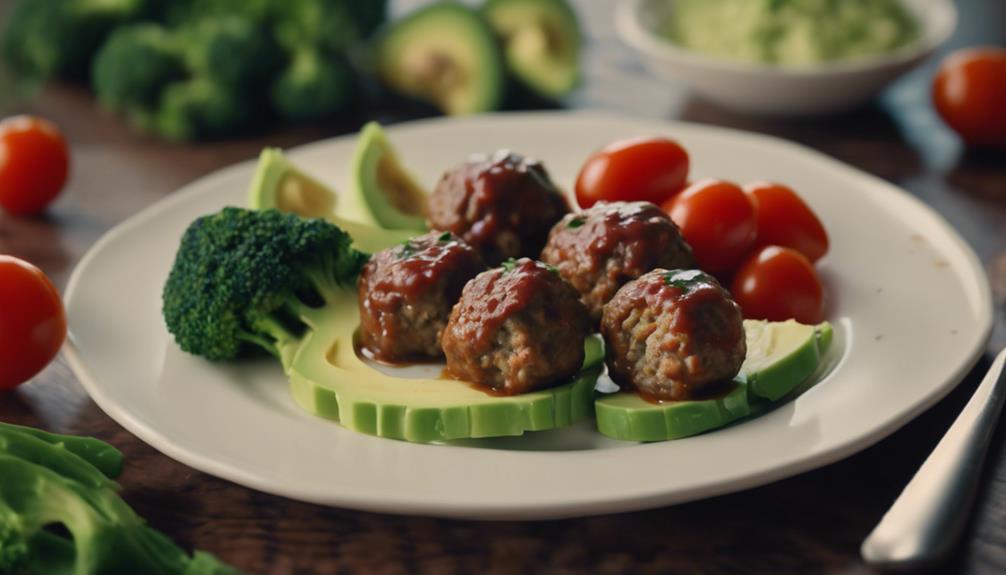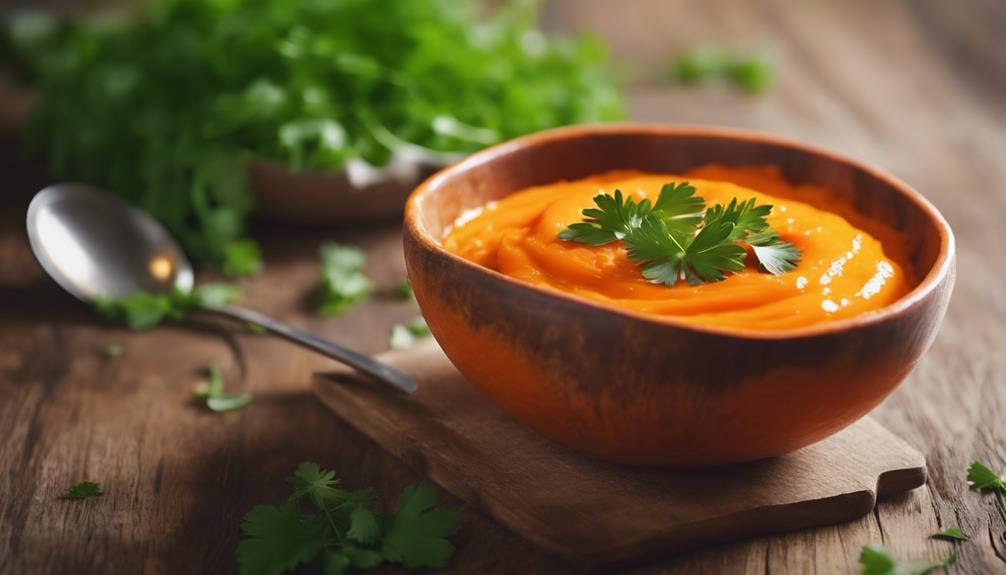Protein-packed and scrumptious turkey meatballs can be a fantastic treat for your baby! These meatballs help **fuel growth** and tickle taste buds. Use lean ground turkey, finely chopped veggies, and tasty seasonings to make every bite irresistible. Shape them small for easy handling and try different herbs for new flavors. Make sure to store any leftovers safely for quick meals later. Give your baby the nutritious and delicious meal they merit with these turkey meatballs!
Key Takeaways
- Introduce lean ground turkey as a protein-rich option for babies around 6 months.
- Incorporate finely chopped veggies and cooked rice for a balanced texture and nutrition.
- Experiment with herbs and spices for flavorful variations in baby-friendly meatballs.
- Shape mini meatballs for easy handling by babies transitioning to solids.
- Store cooked meatballs in the fridge for up to 4 days or freeze for longer shelf life.
Starting Solids Timeline

When to start introducing solid foods to your baby can be determined by observing their cues and developmental milestones around 6 months of age. It's crucial to pay attention to your baby's readiness for starting solid foods, which may include signs like sitting up independently, showing interest in food, and ability to chew or swallow. Introducing solid foods around 6 months is vital as it helps meet your baby's nutritional needs and sets the groundwork for healthy eating habits in the future.
Seeking advice from pediatricians for personalized recommendations on when and how to start introducing solid foods to your baby is advisable. These professionals can provide guidance on the best ways to guarantee your baby receives necessary nutrients from solid foods while still benefiting from breast milk or formula.
Essential Ingredients List

The essential ingredients list for making turkey meatballs for your baby includes lean ground turkey as the primary protein source.
To guarantee a flavorful and nutritious meal, consider incorporating the following key items:
- Finely Chopped Vegetables: Enhance the meatballs with finely diced zucchini and mushrooms. These vegetables not only add flavor but also provide essential nutrients for your baby's diet.
- Cooked Rice: Use cooked rice as a binding agent to help hold the meatballs together. This ingredient also contributes to the texture of the meatballs, making them easier for your baby to eat.
- Seasonings: Elevate the taste of the turkey meatballs with seasonings like garlic, onion, and herbs. These flavorful additions will make the meatballs more appealing to your baby while introducing them to different tastes.
Cooking Instructions and Tips

Now it's time to talk about cooking techniques and recipe customizations to elevate your turkey meatballs.
You can experiment with adding different herbs or fruits to tailor the flavors to your liking.
Remember to shape the meatballs consistently for even cooking and a beautiful presentation.
Cooking Techniques
For enhanced flavor in your turkey meatballs, sauté vegetables in sesame oil until softened before combining with rice, seasonings, and ground turkey.
To make certain your turkey meatballs turn out perfectly, follow these essential cooking techniques:
- Gentle Mixing: Gently combine the rice, seasonings, and ground turkey in a large mixing bowl. Avoid overmixing to prevent tough meatballs.
- Proper Shaping: Shape the meatball mixture into evenly sized balls. Place them on a baking sheet lined with parchment paper for even cooking.
- Thorough Mixing: Mix all ingredients thoroughly before adding the ground turkey. This step guarantees consistent flavor distribution throughout the meatballs.
Recipe Customizations
To customize your turkey meatball recipe for babies, consider adjusting the cooking instructions and incorporating helpful tips to cater to your little one's needs and preferences.
When making meatballs for babies, make sure they reach an internal temperature of 165 degrees Fahrenheit to prevent any potential foodborne illnesses.
To make the meatballs more appealing, try adding finely chopped or pureed vegetables like carrots, bell peppers, or spinach for extra nutrients and flavor.
For babies with allergies, consider substituting breadcrumbs with crushed crackers or oats and using alternatives like mashed sweet potatoes or applesauce as binders.
To introduce new flavors, experiment with herbs and spices such as parsley, oregano, garlic powder, or a pinch of cinnamon in the meatball mixture.
When shaping the meatballs, aim for bite-sized portions to make them easy for babies to pick up as finger foods, promoting self-feeding and fine motor skill development.
Recipe Variations and Substitutions

Consider incorporating different ingredients and adjustments to customize the turkey meatball recipe to your liking. Here are some ways to vary the recipe:
- Swap Ground Turkey: Experiment with ground chicken as a lean alternative to ground turkey for equally delicious meatballs for babies.
- Make Mini Meatballs: Create mini meatballs for babies by shaping smaller portions of the mixture to suit their needs.
- Gluten-Free Options: Use gluten-free breadcrumbs or oats to make the meatballs suitable for those with gluten intolerance, ensuring a safe and enjoyable meal for all.
Storage and Thawing Guidelines

You can store cooked turkey meatballs in the fridge for up to 3-4 days in an airtight container to maintain their freshness and quality.
If you want to save them for a longer period, freezing them in a freezer-safe bag or container is a great option. Frozen meatballs can stay good for up to 3 months in the freezer.
When you're ready to enjoy them, simply thaw the frozen meatballs overnight in the fridge to guarantee even thawing.
For reheating, pop them in the oven at 350°F for about 10-15 minutes or heat them up in the microwave for a quick meal.
Remember, it's best to avoid refreezing previously frozen and thawed meatballs as this can affect their texture and taste.
Following these storage guidelines and thawing instructions will help you enjoy delicious turkey meatballs while maintaining their quality and safety.
Serving Suggestions and Feedback

Let's discuss serving ideas and taste testimonials for turkey meatballs for your baby.
What are some creative ways you can serve these meatballs to make mealtime more enjoyable?
Share your feedback on how your little one responds to the flavors and textures of this nutritious dish.
Serving Ideas
When serving turkey meatballs for your baby, consider pairing them with marinara sauce and spaghetti for a classic favorite. To enhance the meal further, here are some serving ideas to bear in mind:
- Nutritious Pairings: Combine turkey meatballs with sides like sweet potatoes or mashed potatoes for a balanced and wholesome meal that your baby will adore.
- Seasonal Twist: Customize the turkey meatballs with seasonal ingredients such as cranberries to enhance the flavors and make them perfect for a Thanksgiving meal.
- Convenient Option: Leftover turkey meatballs can be refrigerated for future use, offering a convenient and wholesome meal solution for busy days.
Feedback from parents and caregivers highlights that babies appreciate the mild flavor and soft texture of turkey meatballs, making them a versatile and well-received option for mealtimes. By incorporating these serving ideas, you can make sure that your baby enjoys a delicious and nutritious meal with turkey meatballs at the center.
Taste Testimonials
Considering the positive reception from various age groups, including toddlers and adults, the taste testimonials for turkey meatballs highlight their versatile appeal and flavorful attributes. Parents and caregivers rave about the moist texture and flavorful taste of these protein-packed meatballs, making them a hit with toddlers, teenagers, and adults alike.
Serving suggestions such as pairing the turkey meatballs with marinara sauce, pesto, cheese sauce, or ketchup enhance the overall dining experience. These nutritious meatballs aren't only versatile for post-gym snacks or family meals but also offer the convenience of leftovers, perfect for school lunches or freezing for future quick and easy meals.
The feedback emphasizes the satisfaction derived from the delicious taste, making turkey meatballs a go-to option for those looking for a tasty, protein-rich dish that can be enjoyed in various ways.
Frequently Asked Questions
How to Serve Meatballs to a 6 Month Old?
To serve meatballs to a 6-month-old, provide small, soft, and easily mashable portions to prevent choking hazards. Introduce gradually, watch for allergies, and pair with soft veggies or fruits. Adjust portion sizes based on your baby's comfort and enjoyment.
What Is a Good Binder for Meatballs?
When making meatballs, you have various options for binders. Breadcrumbs, eggs, cooked grains, cheese, and mashed vegetables all work wonders. Each adds its unique touch of flavor and texture, ensuring your meatballs turn out perfect.
Are Turkey Meatballs a Good Source of Protein?
Turkey meatballs are an excellent source of protein, providing essential building blocks for growth and development. A 3-ounce serving of ground turkey contains about 21 grams of protein, making it a high-protein option for you.
How to Serve Ground Turkey to a 6 Month Old?
When serving ground turkey to a 6-month-old, make sure it's cooked thoroughly and cut into small, manageable pieces. Mix it with veggies or grains for added nutrition. Remember, variety is key to introducing new flavors and textures to your little one's diet.
Conclusion
To sum up, these turkey meatballs are a great protein-packed option for your baby's mealtime.
Remember, the proof is in the pudding, or in this instance, the meatball!
So whip up a batch, watch your little one enjoy them, and feel good knowing you're providing them with a nutritious and delicious meal.
Happy cooking!











